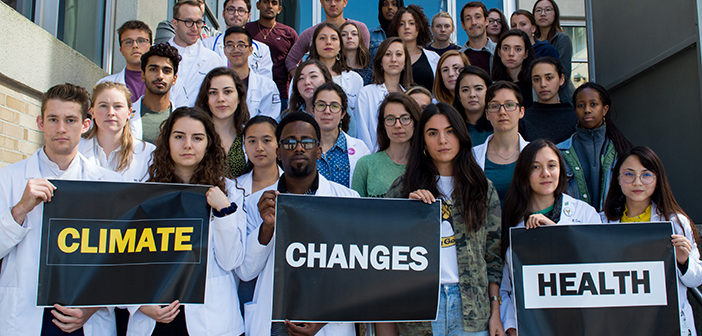OPINION: The consequences of a changing climate on human life could parallel those of COVID-19.
The 50th anniversary of Earth Day falls on a week when the number of COVID-19 cases in the US nears its peak. In the midst of tremendous suffering and uncertainty, Earth Day offers us a window of time to reflect on the state of the planet we inhabit and the looming threat that faces it: climate change.
Climate change, like the COVID-19 pandemic, is a global health crisis. Without drastic prevention and mitigation efforts, the consequences of climate change on human life are feared to parallel those of this pandemic. Increasing numbers of natural disasters and extreme weather events, worsening air pollution, and rising incidence of vector-borne diseases all seek to overwhelm health care systems and disproportionately impact vulnerable and historically marginalized populations.
In honor of the day when medical students at Brown and across the nation hoped to gather with community organizations to advocate for climate action, we reflect on the progress made by medical students leading up this pandemic and highlight what they are doing now to address the climate crisis.
In the spring of 2019, determined to improve the sustainability of The Warren Alpert Medical School, Drew Cox ScM’22 MD’22, Mattie Boehler-Tatman ScM’22 MD’22, and Sarah Hsu ’17 ScM’22 MD’22 founded the AMS Environmental Coalition. Beyond instituting class-wide compost trainings and reusable utensils in the school kitchens, students began working with administration and the community to tackle larger issues.
In January, Winston McCormick MD’23, Gregory Cavanagh MD’23, and Swechya Banskota MD’23 testified at the Rhode Island State House in favor of the Plastic Waste Reduction Act. Over the past few months, Neha Reddy MD’23 successfully piloted a program to provide sustainable menstrual products in the Medical School’s bathrooms, while Megan Duckworth MD’23 teamed up with students at UCSF School of Medicine to release a Planetary Health Justice Report Card for Brown. And fearing that current medical education would not prepare them enough to practice medicine in a world where climate change has already started to wreak havoc, Jordan Emont ScM’20 MD’20, Angela Zhang MD’21, Jessica Hoffen ScM’22 MD’22, and Julia Rothschild ’17 ScM’22 MD’22 started the first iteration of the “Climate Change and Health” elective at The Warren Alpert Medical School last fall.
Now, all of these students have redirected their time to volunteering at the Rhode Island Department of Health, answering the COVID hotline, organizing PPE drives, and sheltering in place with their roommates and families. With limited bandwidth and avenues to take climate action on Earth Day, medical students are instead asking people to commit to one thing: vote.
More than 130 medical students across 39 medical schools joined forces as Medical Students for a Sustainable Future (MS4SF) and released a video calling Americans to vote for “leaders who respect science” and “heed the warnings of climate change.” One by one, medical students reveal their fears for their future patients and colleagues, echoing the fact that climate change is the biggest global health threat of the 21st century. The video ends with students recounting the hope, humanity, and global collaboration that have prevailed through the crisis and urge people to vote for a “sustainable, healthy, and just future.”
In a few years, all of these medical students will take the Hippocratic oath and join their colleagues on the front line. But now, they urge Americans to do what they can to protect the health of all people in the face of climate change. They urge Americans to vote this fall for local, state, and national leaders who will expand protections for health care, housing, and food access, and back policies like universal health coverage, the Green New Deal, and relief packages. As we fight to flatten the curve on COVID-19, we must continue to reflect on what this pandemic has taught us about preparing for a global health crisis.
It’s time for a radical transformation, one that will drastically reduce greenhouse gas emissions and keep our health systems, supply chains, and local economies resilient in the face of crisis.
It’s time to “flatten the curve” on climate change.




